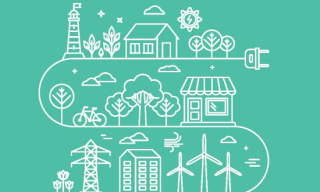
Posted by Margaux-Lucrèce Lelong and Claude Wendling[1]
On September 26, the French government published its first “Green Budget”, as an annex to the 2021 Finance Bill. This event attests to France’s strong commitment, notably under the OECD-led “Paris Collaborative on Green Budgeting” (which France joined in December 2017), to integrate “green” tools into the budget process.
Building on the methodology outlined in late 2019 by two State inspection bodies—the General Inspectorate of Finance (IGF) and the General Council for Ecology and Sustainable Development (CGEDD)—this “Green Budget” has four defining characteristics which make it the most comprehensive in the world to date:
- It provides an assessment of the “green” impact of all State budget expenditures;
- It also covers tax expenditures;
- It reflects not only concerns related to climate change, but also other environmental issues such as biodiversity and the fight against pollution; and
- It rates not only expenditures favorable to the environment but also expenditures with a negative impact.
The “Green Budget” available here (in French) concludes that, out of a total of €574.2 billion in budgetary spending and tax expenditures, €52.8 billion has an impact on the environment (including €41.8 billion in budgetary expenditure):
- €38.1 billion is favorable to the environment on at least one environmental criterion;
- €4.7 billion is favorable to the environment on at least one criterion but has negative effects on one or more other criteria, mainly transport infrastructure, notably railways; and
- €10bn is unfavorable on at least one environmental criterion without having any favorable impact, mostly tax expenditures (€7.2bn, notably the fuel tax).
The Green Budget was prepared by a working group of representatives from the Ministry of Finance (Budget Directorate, Treasury and Economic Analysis Directorate, Tax Policy Directorate) and the Ministry of Ecological and Inclusive Transition. The working group applied the methodology outlined in the 2019 IGF/CGEDD report to the whole budget. This methodology rated State expenditures into five categories ranging from an unfavorable (-1) to a very favorable (+3) environmental impact. It used a grid covering six major environmental goals: (i) the fight against climate change, (ii) adaptation to climate change and prevention of natural disasters, (iii) the management of water resources, (iv) the circular economy, waste and the prevention of technological risks, (v) the fight against pollution, and (vi) biodiversity, and protection of agricultural, forestry and other green areas.
The second step was to integrate an annex on green budgeting into the performance budget circular for 2021, thus explaining to line ministries and agencies the approach described above.
Next, in April 2020, line ministries discussed with the Ministry of Finance’s Budget Directorate how this methodology should be applied in preparing their 2021 budget proposals. In most cases, the analysis went down to the lower level of the French program budgeting framework, namely “actions” or in some cases “sub-actions”. Where relevant, meetings also addressed tax expenditures. Supervised entities were also involved in this work. For example, for the “Research and Development” policy area (“mission”), the classification of expenditures was developed at a very granular level with the main State research agencies, based on an in-depth discussion of their spending patterns.
A final step was for the working group to conduct a consistency check before all the material was consolidated into the “Green Budget” document published with the budget in September 2020.
This policy tool opens new avenues for better decision-making by favoring green fiscal reforms and setting targets for ministries and agencies that give due weight to “green” expenditures. Going forward, the objective will be to take stock of the results of this exercise and consider how to refine the methodology and possibly broaden the scope of the analysis and its reliability. For example, the rating of expenditures that were initially assessed as having a neutral environmental impact, such as spending on government properties, could be reassessed.
A first example of the impact of this methodology on decision-making was provided in the preparation of the French post-COVID-19 recovery plan (published in the 2021 Budget Bill), where the classification of green expenditures was aimed at maximizing environmental-friendly actions and avoiding “brown” expenditures, i.e. expenditures with a negative impact on the environment, to the extent possible.
[1] Margaux-Lucrèce Lelong started her career at the French Cour des Comptes and now works at the French Budget Directorate. Claude Wendling is a Technical Assistance Advisor with the IMF’s Fiscal Affairs Department.
Note: The posts on the IMF PFM Blog should not be reported as representing the views of the IMF. The views expressed are those of the authors and do not necessarily represent those of the IMF or IMF policy.







